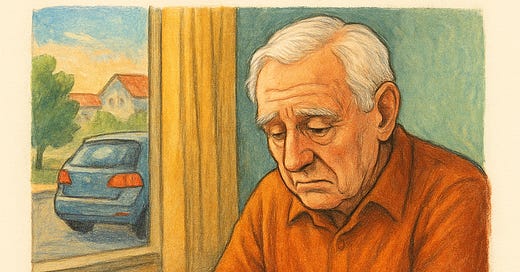There comes a time in life when something we once took for granted is suddenly taken away. For me, that moment came when I had to give up driving. I was 78. It was because of my peripheral neuropathy, which makes my balance unsteady. I knew in my heart that I could become a dangerous driver, and I didn’t want to risk hurting anyone, not even by accident. But knowing it was the right thing to do didn’t make it any easier.
I am 82 now, and I still feel the loss. Not driving anymore has been one of the most frustrating and painful changes of growing older. This morning at breakfast, a woman sitting with us said her daughters took her car away. She’s my age and is starting to have problems with her hearing and memory. She said she feels lost without her car. I understand her completely. We both do.
Driving is not just about going places. It’s about freedom. It’s about independence. When I first learned to drive as a young man, it felt like I had stepped into the world of adulthood. I remember getting my first car. It was thrilling. I could go anywhere I wanted. It was a symbol of being grown-up and capable and strong.
My wife and I spent years driving together across the country. We drove to California, to Quebec City, to the Rocky Mountains, through the Great Plains. We stopped at little towns and big cities and followed the open road just because we could. There were so many memories packed into that car. When she died, I lost my life partner. And when I gave up driving, I lost another part of myself.
It’s hard to explain to people who still drive. They say, just take a bus. Call Uber. Ask your family to drive you. And yes, of course I could. But it’s not the same. It’s not just the money. It’s not just about being polite and not wanting to ask my daughters for help. It’s the feeling I get deep inside that I’m no longer in charge of my life. That I have to wait for someone else to be free to take me where I want to go. That I can’t just get up and go. That hurts. It makes me feel dependent and less like myself.
I used to drive to the library. To the store. To see friends. To visit family. To get a cup of coffee. I could go wherever I wanted, when I wanted. Now, if I want to do those things, I need to plan ahead. I need to ask. I need to wait. And sometimes I just don’t go.
Not driving makes people my age feel more isolated. We’re cut off from our friends. We miss out on the world. And it affects our self-esteem. We feel less like who we once were. The part of us that felt capable, mobile, responsible, and strong starts to fade.
For older people, losing the ability to drive is more than just a transportation issue. It’s a painful loss of autonomy. It can bring sadness, frustration, and even depression. We miss the life we once had and the freedom we once knew.
I know I’m not alone. Many of us are facing this change. And we all feel the same thing. The day the car keys disappear is the day something else disappears too. It’s important that people understand what that feels like. Because when we lose our independence, we need compassion, not just advice.







It might be different for younger generations. The automobile isn’t quite the same symbol of freedom and independence it once was. For many, it’s a symbol of subjugation, to be stuck in the rat race with a daily commute. There are also fewer “third spaces” that young people want to go and hang out in, and much more of people’s free time is being spent online at home. Even when the currently younger generations grow old and lose their automobiles, they probably still won’t understand what made it so hard for Baby Boomers to give up their keys.
It is easy to see how not being able to drive is so much harder on your self esteem and happiness than most people realize. I’m taking notes for when I get to that point. I’m going to find a place that allows me to walk to most places I want to visit!